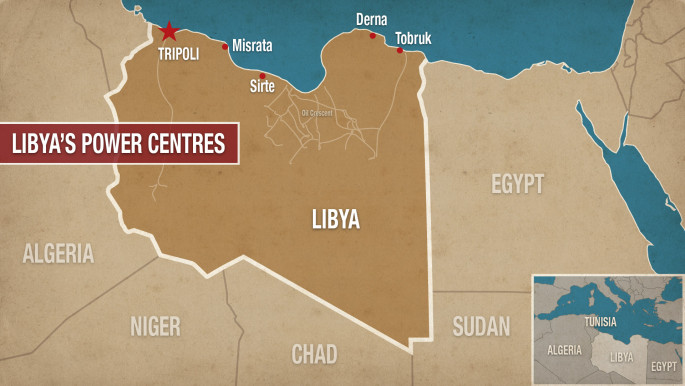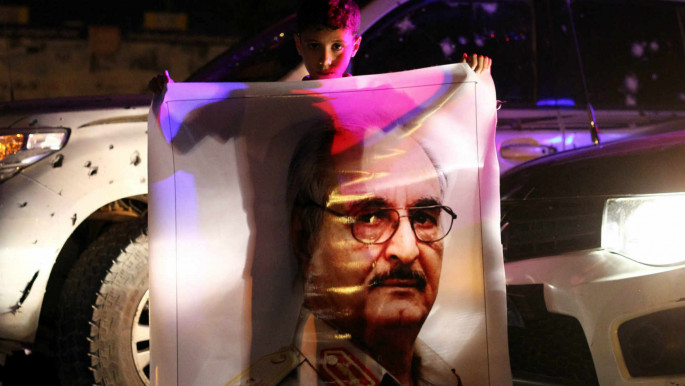The warlord who wanted to be supreme victor: Haftar's Libya offensive kills political process
Just hours earlier, UN Secretary-General António Guterres had arrived in the Libyan capital to prepare for a national peace conference, scheduled for mid-April, with aims to lead to long-delayed elections later this year.
Four days before, Guterres had said that there were signs that Libya's two rival leaders may solve a key dispute over control of the army, that is whether eastern commander Haftar can head a unified Libyan army under civilian command.
Haftar, a former leader in Muammar Gaddafi's military, took control of much of eastern Libya with the support of Russia, Egypt and the UAE in the country's ongoing civil war.
"For me, Haftar's move is essentially an attempted coup against the Government of National Accord [GNA] by imposing a military solution that would translate into a new political reality," commented Emad Badi, researcher and political analyst who focuses on Libya and the Sahel.
Focus in international media has been placed on the UN-sponsored conference, presented as a long-awaited event offering an opportunity to achieve a breakthrough. But what would have been a rare moment of cautious optimism in Libya was a summit planned weeks prior to the peace conference, which was supposed to announce the negotiation of a national unity government, according to Jalel Harchaoui, Research Fellow at The Clingendael Institute focusing on Libya.
 |
|
The geopolitical analyst referred to the summit, which was to be held in late March in Geneva, as a chance to negotiate a "GNA 2.0" (a new national government) that would have got international recognition while being "very pro-Haftar" in its composition. With little influence and power to question it on the part of the head of the Tripoli-based GNA Fayez Al-Sarraj.
Notwithstanding, the military rogue general was expected to make some concessions to parties such as Misrata's moderate factions, the Muslim Brotherhood and other Islamist "enemies" that struck a conciliatory tone wishing to make a deal with him.
Instead, Haftar wanted everything to himself with zero concession in return.
 |
He visualised a scenario where every single dissident and potential opponent would be lying on the floor and him as the only supreme victor |  |
"He visualised a scenario where every single dissident and potential opponent would be lying on the floor and him as the only supreme victor. He wanted full victory, not a partial one which for him would be like a humiliating failure," said Harchaoui, a frequent commentator on Libya.
 |
|
| Read also: Who is Khalifa Haftar, Libya's CIA-linked rogue general-turned-warlord? |
This crucial misunderstanding in the negotiations led to the collapse of the diplomatic process by late March. The Geneva summit did not materialise.
At that point, on March 27, the Libyan general travelled to Riyadh to meet Saudi Arabia's King Salman and discuss the latest developments in Libyan war with him. The talks roughly coincided with Abu Dhabi Crown Prince Mohammed bin Zayed's visit to Egypt, where he met Egyptian President Abdel Fattah al-Sisi.
Although the substance of the meeting between the Saudi king and Haftar was not known to the public, they met after the eastern Libyan troops were making major territorial gains in Libya's southern region of Fezzan and amid growing speculation that the LNA was on the point of waging a military operation to take control of Tripoli.
Read also: Libya PM accuses rival Haftar of 'betrayal' over Tripoli offensive
The Wall Street Journal reported last week that days before Haftar launched the offensive to seize the country's capital, Saudi Arabia "promised tens of millions of dollars to help pay for the operation," which he accepted according to Saudi advisers.
"The offer came during a visit to Saudi Arabia that was just one of several meetings Mr Haftar had with foreign dignitaries in the weeks and days before he began the military campaign on April 4," the Journal said.
Put in other terms, Haftar was provided with greater confidence based on vowed support from Riyadh to initiate his expansionist military campaign.
The rogue general also probably received enough support from his foreign backers to press on with his operation. Egypt, the United Arab Emirates (UAE), Russia and France have been providing the LNA with military and political backing.
Several voices in Libya and in the international community have blamed Egypt and the UAE for protracting and exacerbating the Libyan conflict war through empowering Haftar with external support, leaving him with little incentive to negotiate with the GNA. Haftar had long threatened to take Tripoli, so an LNA operation on the capital was always just a question of time.
 |
Haftar was provided with greater confidence based on vowed support from Riyadh to initiate his expansionist military campaign |  |
Before heading west toward Tripoli, LNA forces expanded to southern Libya. In January, Haftar moved his troops out of their eastern power base to take over major oilfields in the south and by the end of the month they were able to enter Sabha, the largest city in southern Libya.
As part of the southern offensive, the LNA captured the country's biggest oil field, El Sharara, in February – a huge, strategic victory that strengthened the position of Haftar. El Sharara had been formally under the control of groups allied to the UN-backed administration in Tripoli.
As the UN-led national conference was approaching, Haftar had already rushed to maximise his gains on the ground and therefore his leverage over his opponents at the GNA.
This dangerous zero-sum game has set back the political process altogether making very difficult to re-establish any kind of trust among all the actors.
Despite the severity of the situation, the international community showed a rather timid response to the Tripoli offensive failing to see it coming, to react to it or call it out in the early stages.
The UN later postponed the Libyan national reconciliation summit amid violence. "The world body cannot ask people to take part in the conference during gunfire and airstrikes," read a statement by UN envoy to Libya Ghassan Salame.
Badi, who's also a non-resident scholar at the Middle East Institute [MEI], remarked that Western Libya factions feel duped by the international community saying that it has constantly appeased Haftar and downplayed the risk that the attack on Tripoli could take place.
Secondly, he noted, the operation was launched while the UN Secretary-General was visiting Tripoli calling it "a slap in the face of the United Nations". In addition, he highlighted the mistrust between local actors.
"There was a political deal that was put forth, with many conciliatory actors in the GNA and Misrata, and Haftar just blew it off," the MEI expert said.
In his view, the commander is trying to drive more divisions among key factions while gambling on repeating the strategy he used in his recent Fezzan campaign, advancing by co-opting and striking alliances with local groups. However, he's facing stiff opposition around Tripoli.
"I think he underestimated the fact that he's a polarising figure and he can unite different western Libyan factions against him," Badi argued.
 |
If Haftar remains free to continue escalating the situation and dictating the political process without any meaningful response from international actors, then renewed violence seems almost inevitable |  |
This operation appears very different than Haftar's experience in the south as local communities seem to fear rather than welcome his approach, while armed western groups from Misrata and Zintan alongside Tripoli's Protection Force are determined to counter his advance.
Harchaoui insisted that until the start of Tripoli campaign, the political process was alive and promising, given the genuine extent of recognition vis-à-vis Haftar by rival factions.
"There was a real diplomatic co-existence, able to achieve some tacit mutual acceptance of both sides, a relative calm. All of that is gone now," stressed the Libya specialist.
Indeed, April 4 was a turning point in the country's eight-year-long conflict since Libyan long-time ruler Muammar Gaddafi was overthrown in 2011.
Read also: More than 8,000 flee Libya's Haftar Tripoli offensive
Tarek Megerisi, policy fellow specialising in Libya at the European Council on Foreign Relations [ECFR], opined in his commentary written in early April that previous operations conducted by the field marshal have shown that even if he realises his territorial ambitions, it is a lot more likely to result in further conflict than stability.
"If Haftar remains free to continue escalating the situation and dictating the political process without any meaningful response from international actors, then renewed violence seems almost inevitable," the analyst warned.
"This would set Libya's transition back by years".
Follow her on Twitter: @AlessandraBajec





 Follow the Middle East's top stories in English at The New Arab on Google News
Follow the Middle East's top stories in English at The New Arab on Google News


